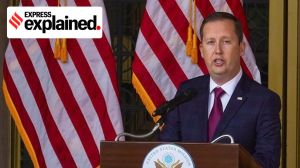Trampling on a tradition
For Indian prime ministers who double as their own foreign ministers, September is the month for grandstanding. The Non-aligned or the Co...

For Indian prime ministers who double as their own foreign ministers, September is the month for grandstanding. The Non-aligned or the Commonwealth or someone gives them the small stage to do their warming-up exercises; the UN General Assembly provides the photo op. Not only the podium with its imposing backdrop but intimate handshakes with the high and the mighty. But come October and the PM8217;s jumbo jet lands with a thud on reality.
It happened with Gujral last September. That was his best month as Prime Minister. Taking care to pack his plane with a posse of fawning journalists, Gujral shifted his dates up and down to spend his five minutes of fame with Bill Clinton. Our Press went all gaga; the country became, for a wink of history, the mouse that roared. Gujral returned from New York, Edinburgh and sundry exotic capitals to find himself out on the ear a few weeks later.
Vajpayee too, after a dreadful Jayalalitha-filled August, got his much-deserved Ramp;R in September. That even brought the smile backto his face. Nothing like a gaggle of besotted NRIs to applaud one back to life.
Alas, NRIs have to be left where they belong as the PM-cum-FM wings his way back to where he belongs which is among the sullen RIs Resident Indians who wish to know what is what. Worse, while the PM8217;s away, home ministers will play. So, Vajpayee landed right in the middle of it the President and most of his allies telling him that Article 356 was not designed to avenge an eight-year-old arrest at Sambalpur, where, in October 1990 Laloo Prasad Yadav punctured the tyres of Advani8217;s Toyota Yatra. The shambles at home, now added to by Badal threatening to do unto Vajpayee what Justice Jain8217;s report did to Gujral, is bad enough. But the mess left abroad is equally worth shaking one8217;s head over.
The hard-core Hindutvist element in the BJP saw Pokharan-II as not only the thumping of their collective chest but also as the opportunity to break the Nehruvian mould of our foreign policy. Vajpayee, who shares little with thefundamentalists in his own party, is, however, a Nehruvian in drag. He wants India to become a nuclear weapon power but retain the essentials of its pre-nuclear weapon foreign policy. The contradictions are beginning to show.
It is no coincidence that Nehru8217;s samadhi is called Shantivan. He was truly a man of peace. For Nehru, the nuclear bomb was not a deterrent but a weapon of mass destruction. Moreover, a weapon of much destruction in the hands of the most irresponsible powers known to human history the product of a civilisation stoked on visceral hatreds and the unending quest for dominance over others. On the one hand, a superpower that had built its nation on the most thorough genocide ever undertaken, that of the Red Indians, and on the sinews of the largest body of people ever enslaved: the blacks. On the other, Stalinist Russia that had just rid itself of 20 million of its own and would have few compunctions about doing worse to The Other. It was in this context that Nehru fashioned aforeign policy predicated on the conviction that India8217;s national security crucially rested on global collective security. Hegemonistic policies of nuclear deterrence were thus seen as incompatible with India8217;s national security as they were destructive of global collective security. Hence the pursuit of nuclear disarmament not only has a moral imperative, to be projected with pride as such, but also as an imperative national security requirement.
Since no known nuclear weapon power espouses the elimination of nuclear weapons, there would have been consistency to India, post-Pokharan-II, abandoning, or at least relegating to a low order of priority, the elimination of nuclear weapons as an over-riding national foreign policy goal. That is, in fact, what has happened to a very large extent. Where the CTBT had been denounced primarily because it did nothing to eliminate nuclear weapons or establish a nexus between the non-proliferation and elimination regimes, the post-Pokharan-II argument for acceding toCTBT has been couched in terms of securing recognition as a nuclear power and, thus, exemption from sanctions imposed for violating the non-proliferation regime of others.
The Talbott-Jaswant talks have focused on how to secure respect for India as a nuclear power while freeing it from the condign punishment that followed. As far as is known, the US is willing to do all it can to accommodate India except to the point of forgiving and forgetting Pokharan-II. The American bottomline is that there are at least 11 threshold nuclear weapon powers besides India and Pakistan who would be tempted to cross the threshold if India and Pakistan are not firmly blackballed from the nuclear weapons club and chastised for their temerity in seeking membership.
Meanwhile, or perhaps because of this stand-off, the old Nehru has started stirring in Vajpayee8217;s breast. Muted reference to 8220;the time-bound elimination of nuclear weapons8221; became more and more strident as he moved from Delhi to Durban to New York. We now have toreconcile our acquisition of nuclear weapons with our demand that others eliminate theirs. However reconcilable that sounds to Indian ears, it rings dreadfully insincere in the ears of others. Which is why whatever papering-over our English-speaking diplomats were able to do at Durban, no one any more takes seriously our protestations about n-weapons elimination.
Once upon a time, 1988 to be precise, we had a specific plan for the time-bound elimination of nuclear weapons in identifiable and verifiable phases. That plan has been dropped by the Vajpayee government only because it bears the name of its author Rajiv Gandhi. No alternative plan has been elaborated. Therefore, our bleating over nuclear weapons elimination carries no conviction. It only confirms us in other people8217;s perception of our hypocrisy.
Which is why the India of Gandhi and Nehru has just been administered its worst-ever slap in the face in 50 years of foreign policy. For the first time in 50 years, India has not even been invited tojoin a trans-continental grouping of nations which will be pressing the Conference on Disarmament in Geneva to convene its Ad-hoc Committee to commence negotiations on a treaty aimed at the elimination of n-weapons.
- 01
- 02
- 03
- 04
- 05































